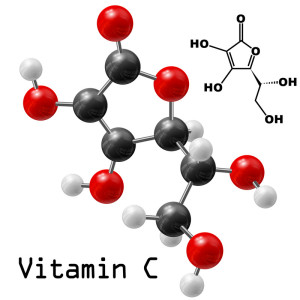Perhaps the most encouraging discovery in recent years in the treatment of cancer has been the role of Vitamin C. Researchers have learned that a concentrated dose of ascorbic acid, delivered intravenously, is selectively toxic to cancer cells while not harming healthy cells.
 It seems that cancer cells, which utilize glucose (sugar) for energy, mistake ascorbic acid for sugar and allow it to penetrate their cells. Once inside the cell, the ascorbic acid turns into hydrogen peroxide, which is toxic to cancer cells. Cancer cells have the ability to neutralize small amounts of hydrogen peroxide, but not the high levels produced by intravenous vitamin C.
It seems that cancer cells, which utilize glucose (sugar) for energy, mistake ascorbic acid for sugar and allow it to penetrate their cells. Once inside the cell, the ascorbic acid turns into hydrogen peroxide, which is toxic to cancer cells. Cancer cells have the ability to neutralize small amounts of hydrogen peroxide, but not the high levels produced by intravenous vitamin C.
Studies at the National Institutes of Health discovered that a rapid infusion of high-dose ascorbic acid led to large concentrations of vitamin C in the extracellular space. The vitamin C reacted spontaneously with the molecular oxygen within cancer tumors and generated large amounts of hydrogen peroxide, causing oxidative stress and toxic overload to tumor cells, much in the same way that chemotherapy is intended to work.
But how can this be possible? It has been known for years that Vitamin C is a powerful antioxidant. So how can it cause oxidative stress powerful enough to kill cancer? The answer, the researchers learned, is simple but a bit difficult to wrap our minds around. The effect of vitamin C within the body is dose-dependent. There are many substances that can generate different effects depending on the size of the dose. A small dose of vitamin C delivered orally works as an antioxidant. A large dose delivered rapidly via IV works as an oxidant within cancer cells.
In the 1970s, Nobel Prize-winning scientist Linus Pauling and his team of researchers promoted intravenous and oral vitamin C for late-stage cancer patients. In two published clinical trials, they reported that patients significantly prolonged their lives and enjoyed improved quality of life with the administration of vitamin C. After numerous follow-up studies, the key finding was that while oral vitamin C functioned as an antioxidant and was ineffective against cancer, high-dose intravenous vitamin C provoked oxidation. Furthermore, numerous infusions of the vitamin led to tumor regression.
The reason high-dose vitamin C does not harm healthy cells is that these cells produce sufficient amounts of the enzyme catalase to neutralize the oxidative effects of hydrogen peroxide. However, cancer cells produce only a small amount of catalase, leaving them vulnerable to oxidation. Our experience at the Hernandez Center supports these findings. Our patients, even those with late-stage diagnoses, feel better overall, with improved quality of life. Our current IV protocols insure blood and tissue levels of vitamin C that are both safe and effective in killing cancer cells.
However, there are some people who do not respond to vitamin C protocols. This is because some tumors do produce enough catalase to neutralize the oxidative effects of hydrogen peroxide. Second, there may be insufficient numbers of catalysts to promote the transfer of electrons necessary to convert ascorbic acid to hydrogen peroxide. There may be a deficiency of oxygen in the extracellular space. Oxygen is also needed to create hydrogen peroxide.
— Dr. Marcel





